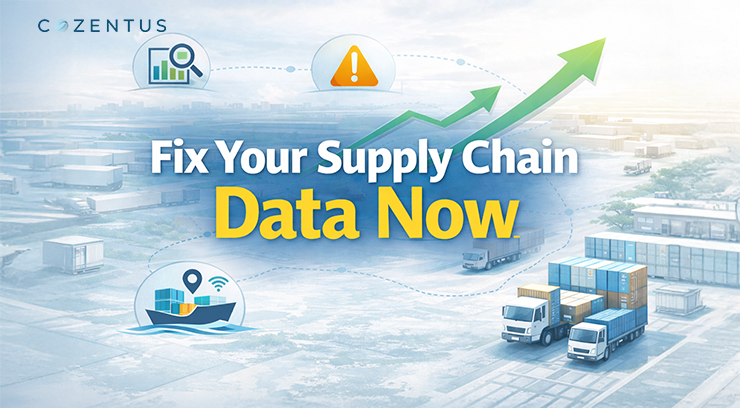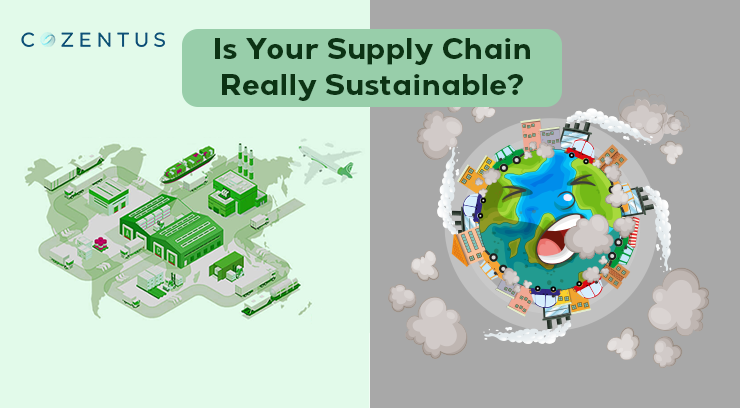For companies looking to optimize profits, supply chain management has emerged as a key differentiator in the quickly changing international business environment. Supply chain methods using Artificial Intelligence and Machine Learning are transforming business operations by offering precision, efficiency, and predictive power.
Thus, businesses are always looking for new and creative ways to streamline their supply chains to cut expenses, increase productivity, and boost consumer happiness.
But what exact function does AI play in the supply chain? How does this new technology provide supply chain optimization and predictive analytics efficiency gains?
These significant questions will be answered in this blog. Thus, if you're interested in finding out more about how to leverage AI and ML to enhance supply chain operations, keep reading this post.
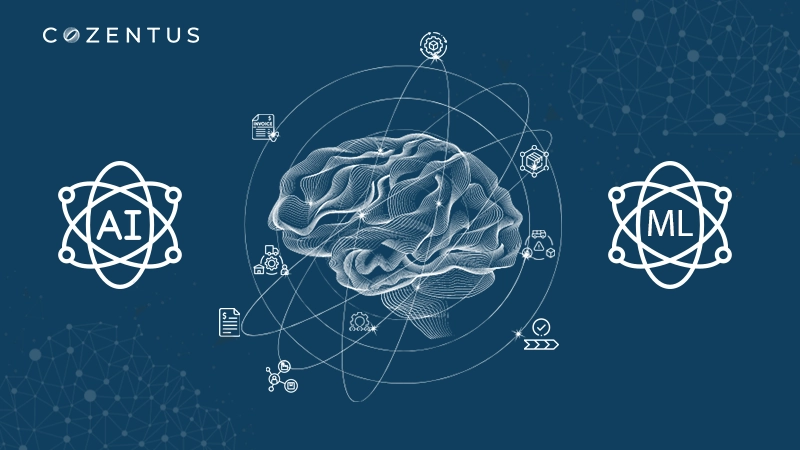
The Need for Transformation in Supply Chains
Supply chain disruptions have never been uncommon. But the global epidemic brought to light some challenges that previously did not rank highly on the minds of business leaders. Following the headlines about the geopolitical confusion, inflation, and macroeconomic uncertainty, supply chain disruptions have taken center stage in many corporate discussions.
PWC estimates that by 2030, AI applications might revolutionize business practices and boost the world economy by up to $15.7 trillion.
There is currently a paradigm shift in supply chain management from just-in-time to just-in-case. Companies now understand that supply-chain disruptions are inevitable, and that risk management requires a comprehensive approach rather than a targeted one for a particular disruption. Here's where supply chains are undergoing a paradigm shift because of the collaborative efforts of AI and ML.
The Current Supply Chain Landscape
A sequential step-by-step methodology was the norm for Supply Chain Management (SCM) in the past with silos being used to manage tasks including production, distribution, inventory control, and procurement. Due to a significant dependence on manual monitoring, historical data, and set schedules, these operations were inefficient and had a limited degree of flexibility.
The paradigm of this conventional model has changed with the advent of AI and ML. Supply chains may become more integrated, dynamic, and predictive with the aid of AI and ML. By getting away with the limitations of traditional SCM, this change enables companies to reduce risks, expedite processes, and better predict market demands. As a result, the supply chain is more intelligent and flexible and can adjust to the complexity of the modern global economy.
Accelerating Supply Chain Success with AI and ML
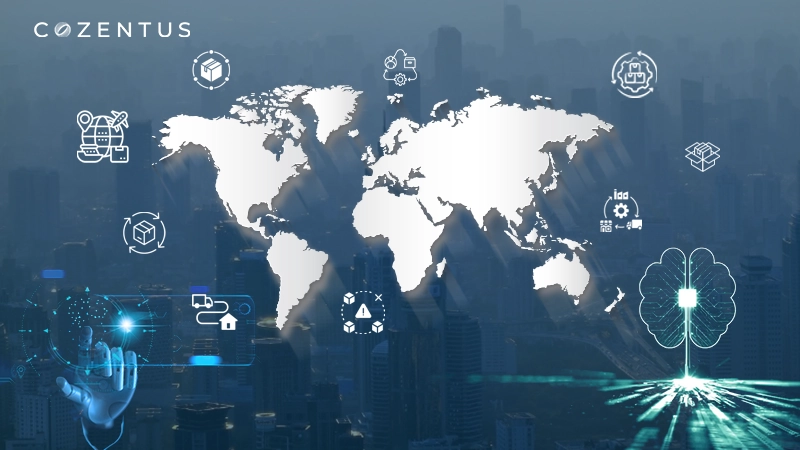
It is critical for executives in business and industry specialists to understand how supply chain operations can be improved with the use of AI and ML. In addition to providing solutions to current problems, these technologies open the door for novel ideas and provide businesses a competitive edge. Let us discuss in detail.
1. Revolutionizing Demand Forecasting and Planning
The paradigm shift of demand forecasting and planning is one of the biggest effects of AI and ML on supply chains. Traditional methods depend on linear predictions and historical data which can produce inaccurate results, particularly in unpredictable markets. To provide more precise and dynamic demand estimates, AI and ML can analyze huge amounts of data from numerous sources, such as market trends, networking sites, and even weather patterns.
Business Impact: Businesses may minimize stockouts and overstock conditions, optimize inventory levels, and match production plans to current market demand with these predictive models. Also, they can increase their responsiveness to market fluctuations and match client expectations while controlling expenses by utilizing AI-driven demand forecasting.
2. Enhancing Inventory Management
Supply chain operations depend on efficient inventory management, which has a direct impact on a company's cash flow and profitability. AI and ML are causing a huge shift in the sector as it develops, allowing companies to more precisely manage inventory levels than in the past. AI-based systems can forecast when and where inventory will be required by analyzing real-time data. Thus, it lowers the possibility of overstocking or understocking.
Business Impact: Replenish orders can be automatically initiated by AI-driven inventory management systems based on predictive analytics, ensuring that appropriate goods are available when needed. In addition, these technologies help ensure the right products are available at the right time, reducing excess inventory and minimizing stockouts, ultimately boosting overall financial performance.
3. Real-Time Risk Management and Mitigation
Supply chain management needs effective risk management. AI and ML are becoming more significant in this regard. In addition to suggesting proactive mitigation techniques, these technologies can identify possible risks in real-time, such as supply disruptions, natural disasters, or geopolitical conflicts.
Business Impact: By analyzing past data to forecast future risks and vulnerabilities, AI-driven risk management solutions can help companies in creating more resilient supply chains and backup plans. By using AI for risk management, businesses can lessen the effects of disruptions and maintain operational continuity.
4. Integrating AI with IoT for Smarter Supply Chains
The use of AI and IoT is helping the supply chain become more intelligent and interconnected. Devices connected to the Internet of Things generate vast amounts of data, including sensors and RFID tags regarding the situation, location, and movement of commodities across the supply chain. This data can be analyzed by AI algorithms to improve a range of operations, including logistics for transportation and inventory management.
Business Impact: AI works with IoT data to continuously monitor perishable items' temperature and humidity during transit, guaranteeing their optimal condition upon delivery. AI is also capable of predicting when machinery or other equipment can break, thus making predictive maintenance possible and reducing operating expenses and downtime. This proactive strategy improves supply chain efficiency and the quality of the goods.
5. Enhancing Workforce Efficiency with AI-Powered Tools
By automating repetitive operations, offering decision help, and freeing up staff to concentrate on higher-value work, AI-powered solutions are improving workforce efficiency. This allows workers in supply chains to focus more on strategic planning and problem-solving and less on tedious handling of information.
Business Impact: AI can handle repetitive jobs like processing inventories, generating reports, and tracking shipments. Thus, allowing staff members to work on more complex and significant activities. This change not only increases output but also boosts employee satisfaction by enabling workers to do more fulfilling and exciting work.
6. Cybersecurity in AI-Enabled Supply Chains
As supply chains include AI more and more, maintaining cybersecurity becomes essential. AI can improve security by quickly identifying and addressing problems, but it can also present vulnerabilities if improperly handled. To safeguard AI systems from cyberattacks, data breaches, and other security risks, supply chains need to be extremely attentive.
Business Impact: AI-driven cybersecurity solutions improve supply chain security by constantly scanning networks for unusual activity and taking proactive measures to neutralize possible attacks. These solutions provide strong protection for SCM while protecting sensitive data. Businesses may safeguard their operations and build trust with partners and consumers by maintaining strict security standards.
Benefits of Implementing AI and ML in Supply Chain
There are numerous advantages to using AI and ML in supply chains that can greatly enhance operations. It includes:
1. Enhanced efficiency and productivity
AI enhances supply chains by automating tedious tasks and enhancing resource management. It monitors activity in real time and identifies possible problems before they become critical. As a result, SC functions more smoothly and effectively by reducing downtime and increasing operational efficiency.
2. Smarter Supply Chain Planning
Machine learning evaluates several factors including supplier lead times and production schedules. This helps firms organize their supply chains more efficiently. It helps to develop a more seamless and well-coordinated supply chain by examining these components. This improves the entire process from manufacturing to distribution, cutting down on delays and increasing overall efficiency.
3. Operational cost reduction
Repetitive tasks like picking and packing orders can be automated with AI-based robots, which can reduce labor costs and increase productivity.
4. Enhancing Shipping and Deliveries
AI solutions can aid in tracking the progress of your shipments and planning efficient shipping routes. AI also detects probable delays and offers to reroute shipments in accordance with the aid of advanced data analytics.
5. Improved Customer Experience
Higher customer satisfaction results from AI-driven personalization and reaction time which makes sure that orders are processed quickly, purchases are fulfilled according to client preferences and problems are resolved right away.
Challenges in Implementing AI and ML in Supply Chain
1. Data Accessibility and Quality
Accurate insights from AI and ML depend on high-quality data. Unfortunately, supply chains frequently work with incomplete or inaccurate data.
Solution: To ensure consistent data collection at every level, make an investment in dependable data management technologies. Also, to improve data quality, implement procedures for data validation and cleansing.
2. Integration with existing systems
It can be challenging and time-consuming to integrate AI and ML technologies with current systems.
Solution: Choose middleware to fill in the gaps or select AI solutions that work with the systems you already use. Thus, integrate these technologies gradually to reduce interference with regular business activities.
3. High Implementation Costs
For some organizations, the initial costs related to integrating AI and ML might be a turning point.
Solution: To show scalability and ROI, begin with pilot projects. Try scalable, reasonably priced solutions that will save you money over time.
4. Talent Gap in Digital Skills
Implementing AI in supply chains requires specialized skills in robotics, AI, and data analytics, which are often in short supply.
Solution: Invest in training programs for your existing workforce, collaborate with academic institutions, and use targeted recruitment strategies to attract skilled talent.
5. Data Privacy and Security
AI and ML systems are liable to privacy issues and data breaches, especially when handling sensitive supply chain data.
Solution: Implement access controls and encryption to improve data security. Update your security measures frequently and make sure that data protection rules are being followed.
6. Cultural Resistance to Change
Employees familiar with traditional methods could be resistant to accepting new technology.
Solution: Encourage the development of an innovative and lifelong learning culture. Clearly explain the advantages of an effective AI-enhanced supply chain, include staff in the decision-making process, and offer complete change management support.
Real-Life Examples of Companies Using AI & ML in Supply Chain
1. Amazon’s Predictive Shipping
Amazon makes predictions about what customers could order and when by using AI and ML. By predicting demand, they can bring goods closer to clients before they place an order. Thus, it ensures the continuous availability of preferred items and reduces delivery timings and inventory control.
2. Oracle Autonomous Supply Chain
Oracle uses AI and ML in its SCM Cloud to improve processes like order fulfillment, inventory control, and demand forecasting. The system facilitates inventory management, procurement automation, and improved demand forecasting for enterprises. It was feasible for the business to provide excellent customer service.
3. Coupa’s Spend Management Platform
Coupa is improving its financial management goods with the use of AI and ML. Businesses can find areas where they can reduce costs and enhance their procurement procedures with the help of this technology. For example, companies can obtain better contracts by using Coupa's AI to forecast pricing and supplier performance.
4. IBM’s Watson for Supply Chain
Watson from IBM uses AI to provide supply chain managers with real-time insights and forecasts. By evaluating data, identifying possible problems, and making recommendations for solutions, it helps businesses manage interruptions. For instance, Watson assisted in locating alternate suppliers and routes to maintain the seamless operation of the supply chain during the COVID-19 epidemic.
5. UPS ORION System
With its ORION system, UPS makes use of AI to choose the most efficient delivery routes. It helps drivers save miles and fuel, which benefits the business with significant cost savings. It does this by looking at traffic, weather, and package locations.
Conclusion
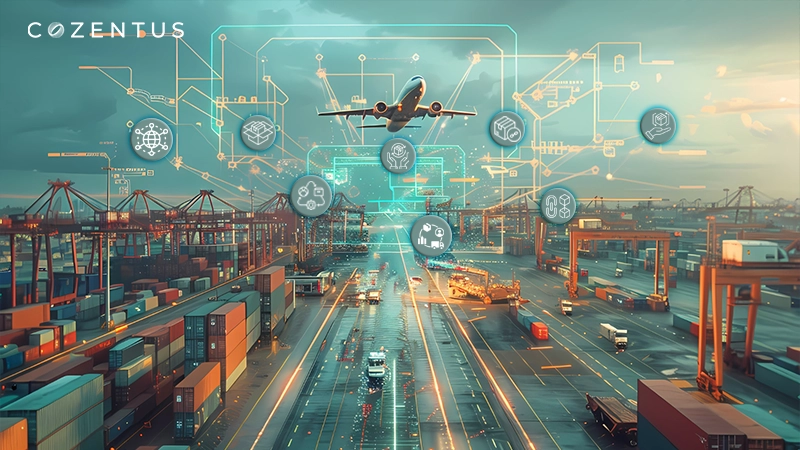
The analysis of the smart supply chain reveals that innovation is essential, not optional. By leveraging the advanced capabilities of AI and ML, businesses can improve efficiency, boost productivity, and drive growth, enabling them to succeed in a constantly evolving market. As we set out on this path of digital transformation, let's keep in mind that change presents both a challenge and a chance for development. We could put ourselves in a position to innovate, compete, and succeed in a time of digital change by embracing this cutting-edge technology.
McKinsey estimates that businesses using AI-enabled supply chain management experienced profits in service levels of 65%, inventory levels of 35%, and logistics costs of 15%.
Adopting AI and ML can greatly boost your company, regardless of size—startup or established. There are numerous benefits that could arise from increasing customer satisfaction and operational efficiency. At Cozentus, we understand how difficult it is to stay ahead in the modern corporate world. Our team of experts is prepared to assist you on your path to intelligent supply chain management, providing customized solutions and knowledgeable direction at any point in time.
Explore Cozentus’ supply chain AI solutions implemented for clients, including Fortune 500 businesses. Schedule a free trial now!
Recent Post
Subscribe to our newsletter
Stay updated on latest trends and news in the supply chain and logistics industry
Join our mailing list for monthly updates
Download Reports
AI-Powered Intelligent Document Processing -Your Launchpad to Digital Transformation
Download
